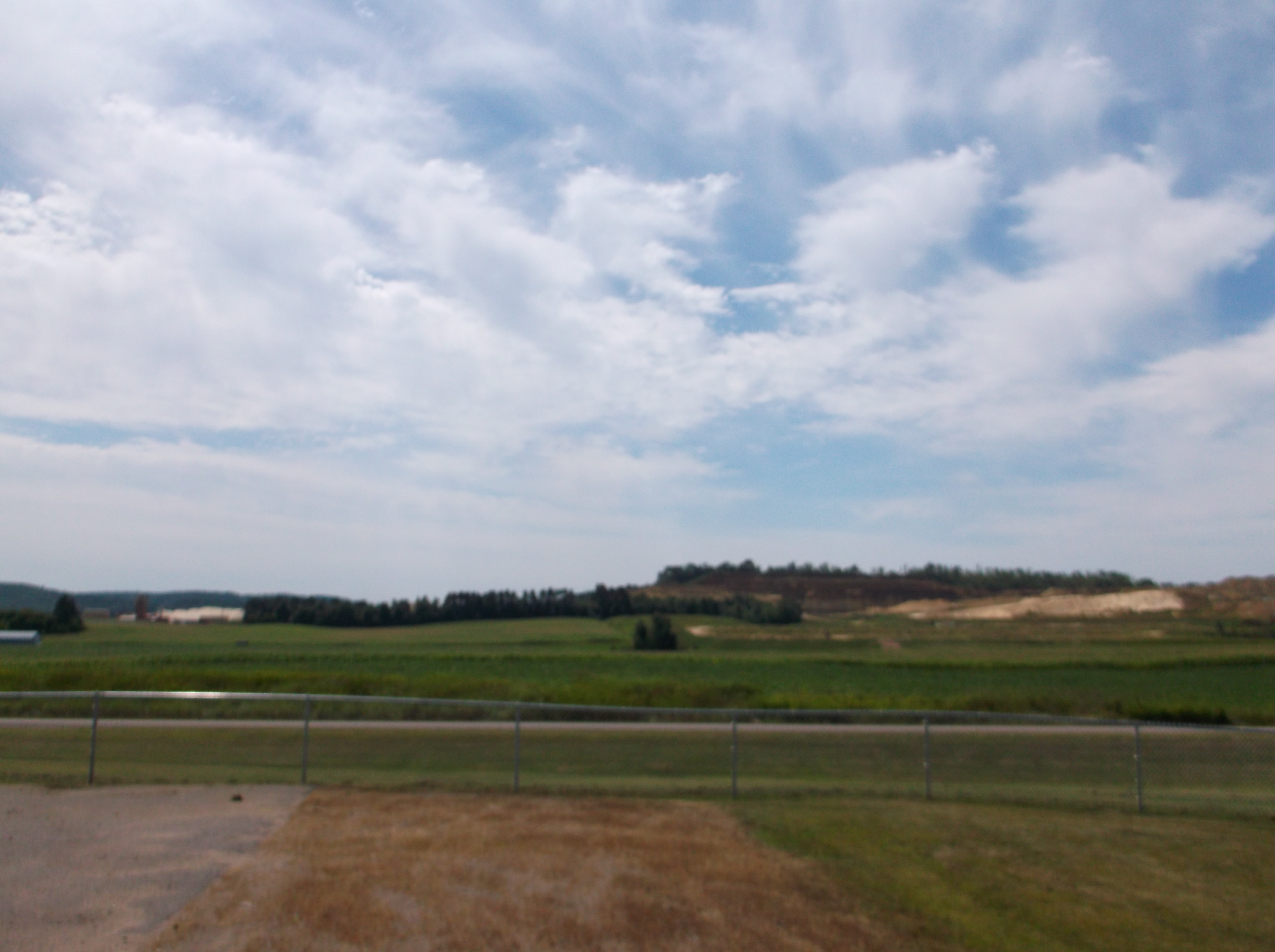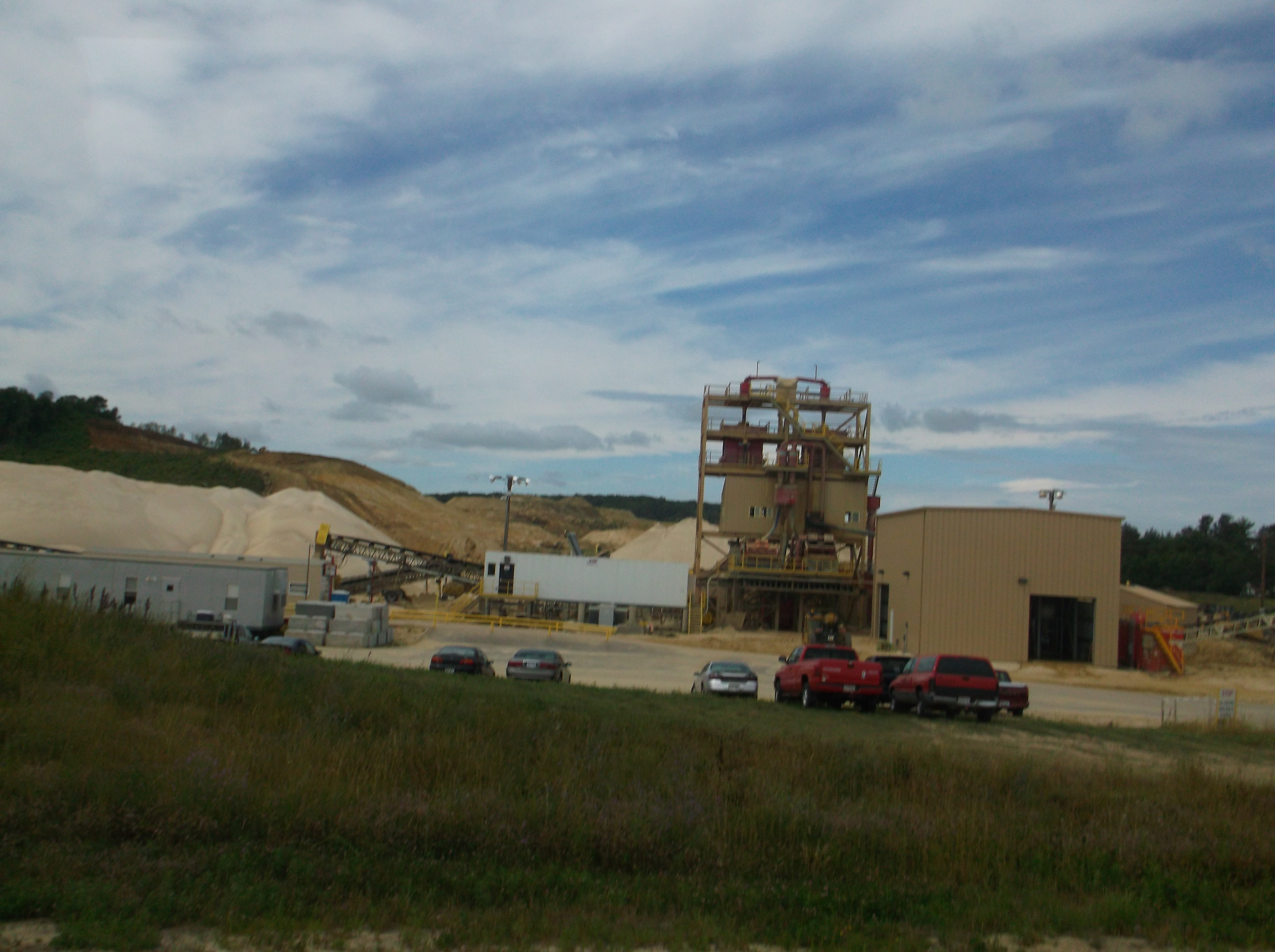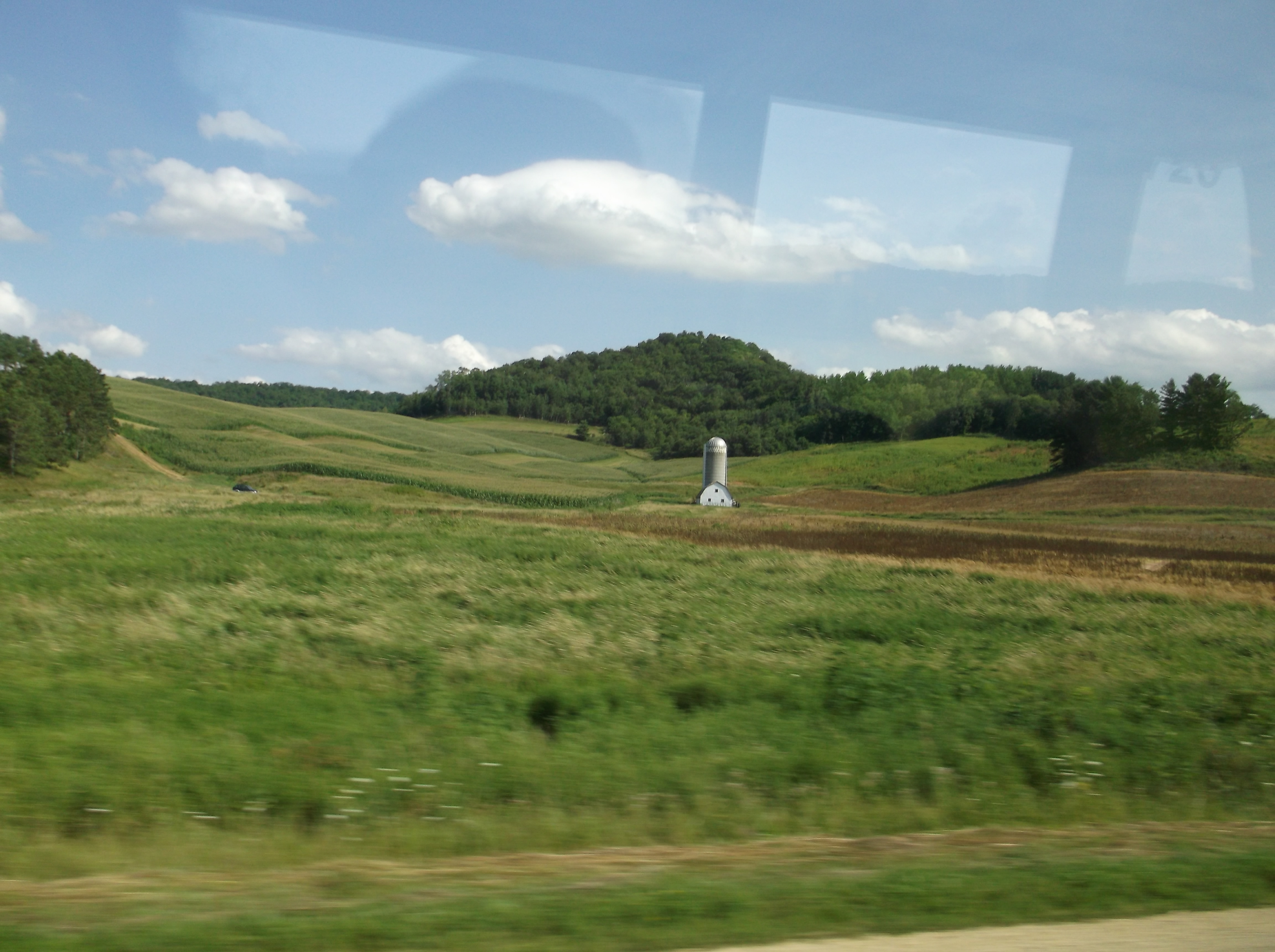
Yesterday, I took an all-day bus tour (sponsored by and including many Allamakee County Protectors) to see frac-sand mining up close in Trempeleau and Chippewa Counties, Wisconsin. In our group were filmmakers, writers, lawyers, water-quality specialists, Winneshiek County Protectors, journalists, farmers, geologists, a member of the Ho-Chunk Nation, a long-distance hiker, and ordinary citizens from many walks of life. The nausea I experienced wasn’t only from the swaying of the bus on curvy, narrow country roads (yes, I am that chronically carsick kid.) At least part of it was from emotions too great to process fully in that moment — looking out the windows at barren sand pits and scraped-away hills, a constant parade of dump trucks and semis rushing past, houses and farms still holding on next to giant mines. On a beautiful clear day, an air of sadness still hung over this farmland, which — aside from the mines — is some of the loveliest I’ve ever seen. Like carcinogenic silica dust itself, that sadness was in the air, drifting through the bus’s air vents, seeping through our skin when we got out to survey one large mine in particular. Sadness, and fear, and resignation, and worry, and anger.

Our guide, a native Wisconsinite who runs a cattle farm in the shadow of another large mine not far from this one, was down-to-earth, understated, and fearlessly and impressively well-informed. In this, he’s typical of the grass-roots opposition to frac sand mining that’s rising up in the so-called “Driftless Region” of Iowa, Minnesota, and Wisconsin. This region — our home — is named for the glacial drift that bypassed this area more than 500 million years ago and left intact, under these rolling green hills, the deposits of pure silica sand (prized for their hardness and perfectly round grains, both signs of advanced geological age) that are now being sought by the fracking industry for use as “proppants” to hold apart the blasted-open cracks, deep below the earth, that allow natural gas to flow up and out. Silica sand, or frac-sand, mining does not bring more than a handful of jobs, and those, as is typical of mining in general, are not sustainable; the companies, most from out of state, prefer to truck in their own crews and equipment. But it does bring blowing silica dust, much finer and therefore more dangerous than ordinary dust; depleted and polluted water tables, from washing the sand; carcinogenic chemicals (acrylamides) left in surface pools of old sand-washing water (which have been known to leak); destroyed roads and bridges; the constant noise and danger of loaded semi and dump-truck traffic on small rural roads; vanishing property values; and the overwhelming sense of helpless betrayal and loss that homeowners in these areas are now feeling as they watch their land disappear. Ordinary farmers and property owners and those whose professions (like mine) normally don’t intersect with mining are scrambling to organize in opposition to a stealthy and totalizing industry which exhibits — to put it politely — widely varying degrees of corporate ethics and responsibility.
This really is a David vs. Goliath fight. And those of us in western Wisconsin, southeastern Minnesota (which has already seen an incursion of sand mining) and northeast Iowa (where we’re still trying to keep sand mining out) are the Davids. “Neighbors vs. invaders” has become an accurate slogan, as we connect and work with and get to know each other over our common interests and our common land. We’re learning more about geology and chemistry and fracking and corporate buyouts of democracy and community rights than we ever knew was possible. We are people from all across the political spectrum who are getting used to being labeled eggheaded radicals and liberals, as if protecting our homes from unbridled corporate greed and insisting that we, too, have rights were a “radical” act. We are taking to the Internet and our town halls and Boards of Supervisors meetings to blog and post and organize and try to help each other and ourselves with the tools we have. We knew it would be hard to see these mines. But we needed a reminder of just what it was we are fighting.

My mind raced, wired and exhausted, as I rode around these areas and sat, on the four-hour ride home, with all I had seen. Railroad cars lined up; sand spilled on tracks; washing and loading facilities; conveyor belts and piles and trucks, trucks, trucks. Giant brown and white pits and scars among the green. Piles of the washed frac sand itself, with an eerie, pearly gleam. So many thoughts; how to organize them all? But like iron filings around magnets, they clustered eventually around two major realizations I struggle, here, to articulate as fairly and clearly as I can.
One: the work against fracking and frac-sand mining, like our overall work to survive as a species in our post-peak-oil, global-warming era, is a struggle between two opposing voices that shape our behavior, that we see externalized in society at large, and that we carry within us every day. One says, “I know I’m not the only creature on earth, and others will come after me, so I need to live with humility and decency to others.” The second says, “Screw you, I want mine, right now.”
What’s mine? Convenience, safety, pleasure, sweet salty somethings to rip out of a bag and scarf down before flinging the bag out your car window and speeding away. And money, money, money. Freud’s model of the human mind would say the first is the superego, and the second is the id, which growls and shouts from down in the basement, deaf to everything except itself. In between, of course, is the ego, where we all live, struggling to reconcile our obligations and ethics and our importunate greed. Because we are human beings, we can and must make choices not to let that id — whether at the personal level or at the level of the corporations seeking profit at our expense — run us, like a border collie runs sheep. We are humans. We can make choices and decisions. And it is our responsibility to look hard at the corporate and social landscape around us and see how our choices are enabled or constrained by the structures in place — with or without our consent — and speak and work to change them, if they do not serve a sustainable, dignified life on Earth for humans and other creatures. The corporate id — unrestrained pursuit of profit and “value” at the expense of everything in its path, shouting sell to me and buy from me and be like what you see on TV and worship “convenience” like a god — has got to be reckoned with and seen for what it is and controlled before it literally kills us all.
Second, as precious few media outlets (with some exceptions) are willing to admit, fracking and frac-sand mining, like mountaintop removal and Monsanto’s copyright predation, are part of the systematic betrayal of rural America that’s been going on since at least the mid-twentieth century. And the way our ads and movies still pay lip service to farmers as “real Americans” — selling back to us the corporate-media image of the real thing they have helped to betray — makes that betrayal even uglier, and sadder.
I am a woman who loves to grow her own food. I grew up on a cattle farm in Alabama. I live in an Iowa town of 8,000 people. I know what it is to love threatened land. Those facts of my identity are the aquifer through which everything I learn from news and reading and everyday life and travel all over the world filters down and settles into meaning in my mind and heart. So. When I look at every corporate wealth-extraction method deployed in rural America — drilling and fracking in the Marcellus Shale and on public lands (without our knowledge or consent), mountaintop-removal mining in West Virginia (it’s more than “removal,” it’s “blasting off and shoving down into the stream below,”) suing farmers for copyright violation for even accidental “use” of genetically engineered seeds, and now the mining of silica sand for use in fracking — I see a recapitulation of every evil thing done in the name of wealth and power to the bodies of the poor and powerless, from the deep past to the present, all over the world. Split open. Forced apart. Ripped away and discarded. Stuffed with engineered “product.” Poisoned. Lied to. Exploited for the benefit of people far away. These things are done to the poor from Bangladesh to the Maldives to the tiny farming towns in your state and mine. These things are done to their land. Like the rest of us, those in eerily named “sacrifice zones” are experiencing in their individual bodies the same things done to the body of their land, our land, our Earth. For example, food deserts and big-box stores combine in the weird paradox of malnutrition, obesity, and diabetes in poor rural communities, where getting food so often means getting in the car to drive to the Wal-Mart in the next town over, because your local grocery store isn’t there anymore. Here in Iowa, I see so many farms with fencerow-to-fencerow corn but no vegetable garden or chicken coop or orchard. I heard that before World War II Iowa produced half — half — all the food produced in America. That’s because each farmstead used to have its own means of food production for itself as well as for the market. Not anymore.
Yet rural people are still so often uncomplaining, matter-of-fact, stoic — particularly in the upper Midwest — about “the way things are.” I don’t want to romanticize, but I see it. They are not just reality-show cliches. They keep on with multiple jobs (including the off-farm job to support the farm, the reason tractors have headlights, for work at night), minimum-wage counter posts at the Kwik-Trip or McDonald’s (all that some small towns have to offer anymore), looking for jobs after the mill or the lumber company or the manufacturing plant has shut its doors and moved operations overseas for greater profit. The kids go to college or otherwise move away and don’t come back. But many of these people still keep on, in tidy houses in tiny towns like the ones we rolled through yesterday, decorated with wind-spinners and impatiens in hanging baskets and flags that say GO PACK GO. When I look at those trainloads of frac sand ready for shipment to Pennsylvania or Ohio or North Dakota, I think about the almost-too-easy way land-as-people metaphor becomes Atlas, here, holding up the earth on his shoulders. These grains of sand – the literal substance of rural America – are blasted into forced-open cracks to hold them open while the stuff that actually makes money flows up, out, and away. Mostly up. Mostly away. The sand will stay down there, in the dark, holding open that fractured shale although no one will ever see. Atlas does not complain. This is the way things are.
Because there is this: our land is our home. Quoted in a story about last year’s sinkhole collapse in Louisiana (another head-clutching instance of mining creating environmental refugees in America — not just Africa or the Maldives, “those other places,” but here) is Oliver Wendell Holmes: “Where we love is home — home that our feet may leave but not our hearts.” And you see the difference between the way we feel about our homes and the way the industry feels when you look at the language of mining and fracking. The layers of trees, soil, grass, and other types of sand scraped away to get at silica are called the “overburden.” The condition in which you may own your land but not own the mineral rights beneath it (perfectly legal, very common) is called “split estate.” When you see such Alicec-in-Wonderland, matter-of-fact distortions of reality surface in words (trees and soil are nothing more than a “burden?” the layer of your land on which you live and in which you grow your food is less important than what’s underneath, and can be separated from that?) you can be sure there is something dirty at work — a “split” of body from spirit and brain, money from value, you from yourself and the deepest, truest things you know. Such alienation is a sign of ill health. But for some people, it is very profitable.
So the way to heal the split is to keep talking about it, keep working against it. And let other people know, too, that it is okay not to go along with what corporations ask of you — which, sadly, is at heart a stunningly, bewilderingly countercultural idea to a lot of us. Talk and listen. You might be surprised what you find.
As our bus waited in a parking lot for our guide to meet up with us, near the beginning of the trip, I got out to walk around and met an employee of the business in question coming cautiously toward me, a hesitant smile on his face. He looked at my Driftless Drift t-shirt and button that said Frac Sand Mining Changes the Land Forever. “What group are you with?” he asked. We are concerned citizens mostly from Minnesota and Iowa, I told him, who are trying to keep frac sand mining out of our counties, because the industry is trying to come in there. And we have come to your county to learn more about what it is like. “How do you feel about it?” he asked me. Well, I said, while I can’t speak for everyone on the bus, I’d venture to say most of us are against it. I am, myself. And then I asked him, how do you feel about it? The wariness on his face lifted a bit, and he looked to the left and the right, as if to see who was listening. “I’ll tell you,” he finally said, “once this industry is in, you can’t get them out. You can’t get them out. And sometimes I wish we had never let them in.” Both of us glanced at the nearby road, where giant yellow semis carrying loads of sand roared back and forth, regular as clockwork. I said I understood where he was coming from, and that’s why we wanted to keep it out of Iowa. Good luck, he said. Thanks, I said. We shook hands.
I thought about this conversation, too, and the look on his face as I rode home through some of the most beautiful land there is. It’s hard work but at one level, not so hard, perhaps. Talk to people honestly about how you feel, about what’s at stake, and you might be surprised what you find. We can save our homes. One person at a time.


** For local newspaper coverage of our trip, click here: http://decorahnewspapers.com/main.asp?Search=1&ArticleID=31728&SectionID=2&SubSectionID=13&S=1
** For another recent article on frac-sand mining in Wisconsin, and the political climate enabling it, click here: http://www.newrepublic.com/article/114320/frac-sand-mining-wisconsin-rides-fracking-boom
Nicely written, Amy…captures the feeling of those of us who are opposed to this greedy industry getting a toehold in Iowa. And to those of us who oppose it because it facilitates the fracking process. However you look at it, it is an industry we don’t want or need…anywhere!
Thank you! And thanks to both of y’all for your tireless and valuable work!
Ah, Amy. You have captured the sense of betrayal, despair, and the stark difference in how industry views the land and how the people who live on it do. But you also lay out a challenge to all of us…We will keep talking, and keep educating ourselves and, through a variety of paths, will find a way to save this land that we love.
yes indeed, sister Janet! 🙂 Thanks for reading, and for your own great work!!
Excellent read..as a farmer from years past (our farm was just sold to another farmer), I wept at your commentary. We grew up and had pigs, chickens, cows..grew enough food for our family and others in the community..and it’s no more like that. Farmers are growing corn, corn, corn..some soybeans..no oats or alfalfa, unless the farmer has a few steers to raise. I still have a few chickens for my own use, and grow a few things in my garden..but will strive to do more. we are manipulated by the almighty dollar.
Thank you so much for this thoughtful and poignant response. I am really sorry you are having to go through this.